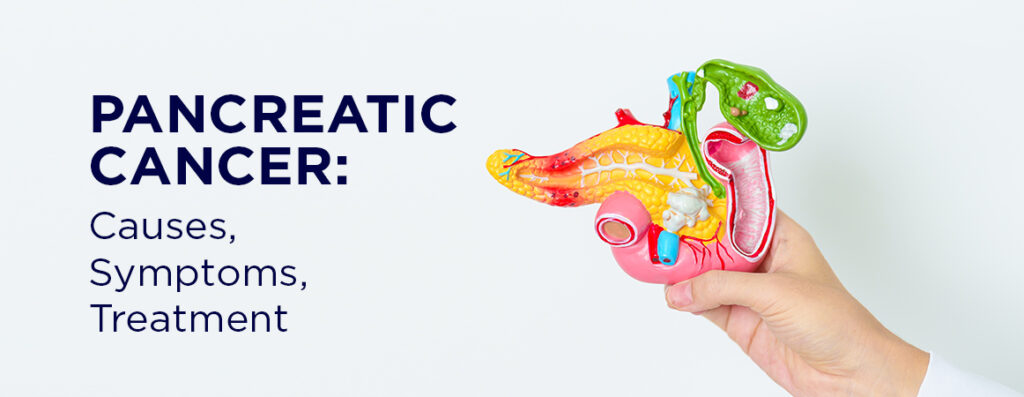Pancreatic Cancer: Causes, Symptoms, Treatment
Pancreatic Cancer Causes
Although the precise causes of pancreatic cancer are not entirely known, several risk factors have been found to raise the chance of contracting the illness. These include:
- Genetic Mutations: Changes or mutations in the DNA of pancreatic cells can cause them to grow uncontrollably, forming a tumor. Some genetic mutations can be inherited, while others may occur spontaneously.
- Family History: A family history of pancreatic cancer or other genetic syndromes that increase cancer risk.
- Chronic Pancreatitis: A higher risk of pancreatic cancer is linked to chronic pancreatitis, a persistent inflammation of the pancreas. This can be exacerbated by conditions such as gallstones and cystic fibrosis.
- Diabetes: There is a link between diabetes, particularly long-standing diabetes, and pancreatic cancer. New-onset diabetes in older adults can sometimes be an early symptom of pancreatic cancer.
- Smoking: One of the biggest risk factors for pancreatic cancer is smoking. Pancreatic cancer is twice as common in smokers than in non-smokers.
- Obesity: Being overweight or obese increases the risk of many types of cancer, including pancreatic cancer. Fat tissue may produce hormones that can stimulate cell growth.
- Diet: A diet high in red and processed meats has been linked to an increased risk of pancreatic cancer, while diets rich in fruits and vegetables may have a protective effect.
- Age: The risk of pancreatic cancer increases with age, with most cases occurring in people over the age of 60.
Recognizing Pancreatic Cancer Symptoms
Pancreatic cancer symptoms often do not appear until the disease is advanced, making early detection challenging. Some common symptoms include:
- Jaundice: Yellowing of the skin and eyes occurs when the tumor blocks the bile duct, causing a buildup of bilirubin in the body.
- Abdominal Pain: Pain in the upper abdomen that radiates to the back can be a symptom of pancreatic cancer. After eating or lying down, the pain could get worse.
- Unintended Weight Loss: Significant and unexplained weight loss is a common symptom of many cancers, including pancreatic cancer.
- Loss of Appetite: A reduced desire to eat or feeling full quickly after starting to eat can be a sign of pancreatic cancer.
- Nausea and Vomiting: These symptoms may occur if the cancer presses on the stomach, causing an obstruction.
- New-onset Diabetes: As mentioned, diabetes can be both a risk factor and a symptom of pancreatic cancer, especially if it develops suddenly in older adults.
- Changes in Stool: Pale, greasy, and foul-smelling stools can result from the pancreas not releasing enough digestive enzymes.
- Blood Clots: Pancreatic cancer can increase the risk of blood clots in the legs (deep vein thrombosis) or lungs (pulmonary embolism).
Pancreatic Cancer Treatment
The course of treatment for pancreatic cancer is determined by the cancer’s stage, location, and general health of the patient. Options include:
1. Surgery
Surgery is the only potential cure for pancreatic cancer, but it is suitable for only a small percentage of patients. Procedures include:
- Whipple Procedure: Removes the gallbladder, part of the bile duct, the head of the pancreas, and a portion of the small intestine.
- Distal Pancreatectomy: Removes the tail of the pancreas and possibly the spleen.
- Total Pancreatectomy: Removes the entire pancreas and parts of other nearby organs.
2. Radiation Therapy
To eradicate cancerous cells or reduce tumor size, high-energy radiation is employed. It can be used before surgery to make the tumor easier to remove or after surgery to kill any remaining cancer cells.
3. Chemotherapy
Uses drugs to kill cancer cells or stop them from growing. It can be used before surgery (neoadjuvant chemotherapy) to shrink tumors, after surgery (adjuvant chemotherapy) to kill remaining cells, or as a standalone treatment in advanced stages.
4. Targeted Therapy
Targeted therapy stops the proliferation of cancer cells by using medications that specifically target genes or proteins in cancer cells. A common treatment for advanced pancreatic cancer is this one.
5. Immunotherapy
A newer approach that helps the immune system recognize and attack cancer cells. It is being studied in clinical trials for pancreatic cancer.
6. Palliative Care
Palliative care is centered on symptom relief and enhancing life quality. This can involve providing dietary guidance, psychological support, and pain management.
Conclusion
Pancreatic cancer is a formidable disease with often subtle and late-appearing symptoms. Understanding the pancreatic cancer causes, recognizing pancreatic cancer symptoms, and exploring pancreatic cancer treatment options are essential steps in managing this condition. Early detection and a comprehensive treatment plan tailored to the individual can significantly improve outcomes and quality of life for those affected by pancreatic cancer.
Post Disclaimer
The information contained in this post is for general information purposes only. The information is provided by "Pancreatic Cancer: Causes, Symptoms, Treatment "and while we endeavour to keep the information up to date.
Legal Disclaimer
We do not claim to cure any disease which is considered’ incurable ‘ on the basis of scientific facts by modern medicine .The website’s content is not a substitute for direct, personal, professional medical care and diagnosis. None of the medicines mentioned in the posts ,including services mentioned at "medicineguide.us" should be used without clearance from your physician or health care provider.
Testimonials Disclaimer– : Results may vary, and testimonials are not claimed to represent typical results. The testimonials are real, and these patients have been treated with homeopathy treatment from our clinic . However, these results are meant as a showcase of what the best, Medicine can do with their disease contions and should not be taken as average or typical results.


